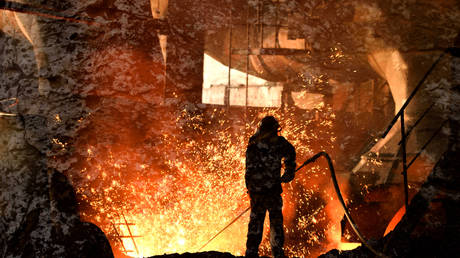Eurozone factory activity nosedives – S&P Global
The euro area’s downturn is reportedly being driven by the bloc’s struggling economic powerhouse, Germany. source:TROIB RTS

The key PMI index contracted for a 20th consecutive month in February, the latest data shows
Manufacturing activity across the 20 countries that use the euro has continued to decline, largely due to a slowdown in the area’s leading economy Germany, according to a study by S&P Global.
The report said the Purchasing Managers’ Index (PMI) for manufacturing dropped to 46.5 in February from 46.6 in January. The figure is higher than the preliminary reading of 46.1, but below the 50-mark separating growth from contraction for a 20th straight month.
Total factory output across the euro area continued to shrink last month, although the rate of contraction was unchanged from January. Nevertheless, Eurozone manufacturers were able to clear orders pending completion, S&P wrote.
Commenting on the data, the chief economist at Hamburg Commercial Bank, Cyrus de la Rubia, said: “The Eurozone’s one-year industrial recession is not coming to an end. Output has declined again at the same pace as the previous month, mainly due to the heavyweights Germany and France.”
According to the report, the German economy registered its sharpest deterioration in four months in February. Separate research by S&P Global showed this week that German manufacturing activity dropped well below expectations last month, indicating an accelerated economic downturn.
READ MORE: German manufacturing hits four-month low – S&P Global
De la Rubia noted that the softer decline in input prices across the Eurozone last month was unlikely to be wholly due to tensions in the Red Sea, but rather to movements in commodity prices, such as the recent rise in oil prices.
“The fundamental trend of lower demand, which remains the primary driver of faster delivery times, continues to persist,” the economist concluded.
For more stories on economy & finance visit RT’s business section
Find more stories on Business, Economy and Finance in TROIB business












